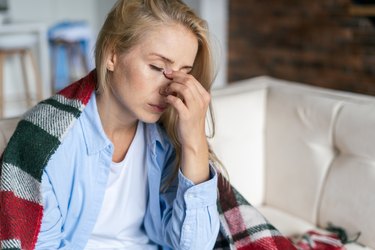
Everyone feels sad or down from time to time. But you might notice you're experiencing more significant bouts of "the blues" with every candle you add to the birthday cake.
Though most seniors feel satisfied with their lives, depression can develop later in life and is a pretty common issue among elderly people, according to the National Institute on Aging (NIA)
Video of the Day
Video of the Day
Upwards of 5 percent of older adults living in the general community experience depression, per the National Council on Aging (NCOA). These rates jump to 11.5 percent and 13.5 percent for senior citizens who are hospitalized or require home health care, respectively.
While depression is more likely to occur in older people, it is a serious mood disorder — which affects the way you feel, think and behave — and it is not a natural part of aging. Even so, close to 60 percent of individuals over the age of 65 believe that depression is a "normal" aspect of growing older, per the Mental Health America (MHA).
"At all stages of life, depression is most common when contending with stressful life changes, and aging certainly involves many of these," says Jodie Skillicorn, DO, a holistic psychiatrist and author of Healing Depression Without Medication: A Psychiatrist's Guide to Balancing Mind, Body, and Soul.
Take a look at six reasons why depression can develop as you get older, plus steps you can take to help support your mental health and emotional resiliency. But as you read through this list, keep in mind that the reasons for a depressed mood are often multilayered, and that these factors can raise your risk — but don't automatically cause — depression with age.
1. You're Less Physically Active
The older you get, the greater your tendency to be more sedentary. But "whether young or old, lack of physical activity doubles the risk for depression," Dr. Skillicorn says. That's because movement not only benefits your body but also your brain health and emotional wellbeing.
Here's why: Physical activity triggers the release of certain feel-good brain chemicals that increase feelings of happiness and relaxation while reducing anxiety, according to the Mayo Clinic. Regular exercise can also promote mental health by enhancing your energy level, improving your quality of mood-supporting sleep and empowering you to feel more confident and in control, per the NIA.
And you don't need to commit a ton of time to the gym either.
"Research shows that just one hour of exercise a week, which can be broken down into just nine minutes a day, can reduce the risk of depression by 44 percent," Dr. Skillicorn says. Not to mention the physical incentives you'll gain, including improved bone density, muscle strength, heart health and even an increase in longevity. "Those are big advantages for a relatively short period of time," she says.
What May Help
“It doesn't really matter what we do, only that we do something,” Dr. Skillicorn says. “Moving can be as simple as walking, stretching or doing gentle exercises like tai chi and qi qong, which have been shown to also help with balance and preventing falls as we age,” she says.
2. You're Dealing With a Chronic Health Condition
More than 90 percent of seniors have at least one chronic health condition such as stroke, cancer, cardiovascular disease or diabetes (and nearly 80 percent have two or more), according to the American Psychological Association (APA).
"When dealing with chronic illnesses, it becomes extremely difficult — perhaps even impossible — to distinguish the symptoms of the disease from depression," Dr. Skillicorn says. "Even when we have a simple cold, much less something more severe, we have less energy, less motivation, less interest in doing the things we normally like to do, changes in sleep and loss of appetite," she says. We're also inclined to be more irritable and moody.
While these are all symptoms of depression, they're also a normal response to sickness. "It's our body's way of reserving energy and resources for healing," Dr. Skillicorn says.
"However, if our illness continues for a long period of time (prolonged COVID is a good example of this), then we tend to get frustrated that we're not feeling better and start to spin negative stories in our heads," Dr. Skillicorn says. For example, we may worry that we'll never recover, or we might feel unproductive, worthless and powerless about our current situation.
"Those negative stories not only weigh us down even more but create more stress in the body, which increases the release of cortisol," Dr. Skillicorn says. This just results in more inflammation, making it even harder to recover. And this damaging domino effect is a recipe for depression, she says.
What May Help
If you’ve been feeling down for a few weeks or months, speak with your health care provider who may start by reviewing your medications, even things considered over-the-counter depression meds. Some prescription drugs used to treat medical conditions can trigger depression, according to the NCOA. If your doctor suspects that your medicine is making your depressive symptoms worse, they may choose to lower your dose or prescribe you an alternative medication.
It’s also vital to have a solid support system in place when dealing with chronic disease and depression. Leaning on trusted loved ones and/or speaking with a therapist can also help you cope with these difficult physical and mental health challenges in a more positive, healthy way.
Additionally, eating a nutrient-dense, balanced diet may be another useful strategy as well. A healthy eating pattern can improve your energy and, in certain cases, may help mitigate some medical conditions that raise your risk for depression, per the NCOA.
3. You Have Dementia
"The symptoms of dementia and depression can overlap significantly," Dr. Skillicorn says. For example, decreased energy and loss of interest in activities are both indicators of dementia and depression. And often one disorder contributes to the other.
Sometimes, depression is an early warning of dementia while other times cognitive impairment can cause depressed mood.
As the brain becomes more impaired during dementia, focusing on tasks and doing activities grow progressively more difficult, Dr. Skillicorn says. Because they require increased effort and energy, they lead to fatigue and frustration.
"Being less able to engage can not only feel frustrating but also isolating," Dr. Skillicorn says. "This may lead some to disengage from people and activities formerly enjoyed, which just perpetuates the problem," she adds.
What May Help
While many people may successfully manage depressive symptoms with medications such as antidepressants, they aren’t the answer for everyone, Dr. Skillicorn says. In certain people, including those with dementia, antidepressants may increase anxiety, worsen cognitive dysfunction and disrupt sleep, which, of course, can exacerbate depression, she says.
For people dealing with depressed mood associated with dementia, Dr. Skillicorn says emotional support, empathy, patience and encouragement to engage in social and physical activities are most important. She points to a March 2021 systematic review published in BMJ which concluded that the most effective treatments for dementia-related depressive symptoms were not drugs but cognitive stimulation with social interaction and exercise.
“Other effective options included reminiscence therapy, animal therapy, as well as massage and touch therapy,” Dr. Skillicorn says.
4. You Have Sleep Problems
Lack of sleep can negatively impact your physical health, contributing to many chronic illnesses including heart disease, cancer and even death, Dr. Skillicorn says. But it can also have a major impact on your mental health.
People who deal with sleep deprivation have triple to quadruple the risk of developing depression, Dr. Skillicorn says. When you're starved for sleep, your energy plummets, which may increase feelings of frustration, rumination and depression, Dr. Skillicorn says.
And these depressive thoughts and feelings can further sabotage your sleep, so it "can become a difficult feedback loop to untangle," she adds.
With age, you're more likely to run into these sleep troubles. "Changes in quality and duration of sleep are especially common in older adults," Dr. Skillicorn says.
"This is at least partially due to disruption of the body's internal clock, which occurs as one grows older," Dr. Skillicorn says. This internal clock controls your body's circadian rhythms, which not only regulate when you feel sleepy, but also when you feel hungry and when your body releases certain hormones, she says.
"Sunlight is the primary cue that drives this rhythm, but research has shown that many older people do not get sufficient daily exposure to daylight," Dr. Skillicorn says. "This [issue] is even worse for those living in nursing homes," she adds.
Complicating matters, chronic illness — and some medications used to treat health conditions — can also disrupt sleep and contribute to problems with depression, Dr. Skillicorn says.
What May Help
“The best place to start to address sleep, after ruling out treatable issues like sleep apnea, is to establish basic sleep hygiene,” Dr. Skillicorn says. She recommends the following habits to help get a peaceful night’s slumber:
- Go to bed and wake up at a consistent time
- Avoid or limit caffeine and stimulants after noon
- Soak in some sunlight (get outside every day or at least spend time near a window)
- Get exercise during the day to help your body feel tired at night
- Avoid eating a large meal just before bed
- Create a relaxing sleep environment (lower the thermostat, dim the lights and turn off all electronics)
- Create a bedtime ritual to follow 30 minutes before bed to alert your body that it’s time to prepare for sleep (think: meditation, light stretching or listening to soothing music)
What about pharmaceutical sleep aids? Often a shortage of sleep is dealt with by prescribing medication, but this strategy isn’t always effective, Dr. Skillicorn says. Case in point: On average, sleep meds may only give you an additional 35 minutes of sleep, according to the Cleveland Clinic.
In addition, many sleep drugs have serious side effects including cognitive impairment as well as an increased risk of dementia, fatigue, depression and anxiety, Dr. Skillicorn says.
5. You're Struggling With Major Life Stressors
Stress is a fact of life at any age. But seniors face a variety of uniquely stressful circumstances that increase their probability of developing a depressed mood.
"Major stressors of all kinds, whether life transitions, losses or physical illness, can play a big role in depression," Dr. Skillicorn says.
Other common sources of stress in older age include, per the NCOA:
- Decreased functional ability
- Reduced mobility
- Elder abuse
- Caregiver stress
- Financial issues related to retirement
What May Help
“Although stress cannot be avoided, the important thing to remember is that it is not the stress itself that leads to depression, physical illness and even death, but our perception of the stress,” Dr. Skillicorn says.
Again, speaking to a mental health professional can help you process and navigate negative thoughts. “By learning to see life changes as opportunities for growth rather than resisting and resenting them, we have the capacity to minimize the effects of the stress, and shockingly, even have better physical and emotional outcomes than those with less stress,” Dr. Skillicorn says.
What’s more, incorporating activities like mindfulness meditation and yoga into your daily routine can also help you cope with stress and improve your emotional well-being.
"Humans are social beings who require social connection, yet nearly half of Americans report feeling lonely," Dr. Skillicorn says.
This isolation seems to increase as we age. Whether it's the loss of a loved or limited mobility that keeps us from connecting with others, many older folks find themselves spending more time in solitude in their senior years.
"Research shows that loneliness is more detrimental to our health than obesity or smoking," Dr. Skillicorn says. "Just like stress, physical illness and lack of sleep and exercise, loneliness increases cortisol levels."
This leads to inflammation that increases the risk for not only depression, but also anxiety, dementia, heart disease and stroke, she adds.
What May Help
The best medicine for loneliness is social connection.
“In Great Britain and Canada, there is a movement for ‘social prescribing,’” Dr. Skillicorn says.
“Instead of writing scripts for medications, doctors encourage social connection by prescribing a trip to a museum, an afternoon of bingo or a gentle yoga, art or singing class,” she says. In other words, “anything to engage and connect with others while doing something enjoyable.”
Believe it or not, “one trip to a museum, for example, has been shown to decrease cortisol levels as much as exercise,” Dr. Skillicorn says.
And if you’re physically unable to engage in in-person activities, you can still stay connected to your community in other ways. For example, try regularly FaceTiming with friends and family or joining an online club.
Tip
“Very often the reason for a senior person’s social isolation is due to the loss of a loved one, which leads not only to disconnections but also grief,” Dr. Skillicorn says. “It is important to note that grief is not depression, but a normal and unavoidable part of loss,” she says.
“Having support, whether that is a close friend, therapist or support group to share these feelings is an important part of healing,” she adds.
Signs of Depression in Older Adults
Being able to recognize the symptoms of depression is the first step to getting help.
However, sometimes it can be difficult to spot depression in older adults since they often exhibit different symptoms than younger people, according to the NIA. For example, some may not experience the telltale sadness associated with depression, but rather feelings of numbness instead.
While the following signs of depressed mood are most common, keep in mind that every individual is unique, so their symptoms can vary, per the NIA:
- Persistent sad, anxious or "empty" mood
- Feelings of hopelessness, guilt, worthlessness, helplessness or numbness
- Irritability, restlessness or having trouble sitting still
- Loss of interest in once pleasurable activities, including sex
- Decreased energy or fatigue
- Moving or talking more slowly
- Difficulty concentrating, remembering or making decisions
- Difficulty sleeping, waking up too early in the morning or oversleeping
- Eating more or less than usual, usually with unplanned weight gain or loss
- Thoughts of death or suicide or suicide attempts
Warning
Depression can greatly impair your quality of life, and you shouldn’t have to navigate it on your own. If you’re thinking about harming yourself, speak to a trusted friend, family member or health care provider right away or call the National Suicide Prevention Lifeline at 1-800-273-8255.
- National Institute on Aging: “Depression and Older Adults”
- National Council on Aging: “How Common is Depression in Older Adults?”
- American Psychological Association: “Older Adults Health and age-related changes”
- Mental Health America: “Depression In Older Adults: More Facts”
- National Institute on Aging: “Real-Life Benefits of Exercise and Physical Activity”
- Mayo Clinic: “Exercise: 7 benefits of regular physical activity”
- BMJ: “Comparative efficacy of interventions for reducing symptoms of depression in people with dementia: systematic review and network meta-analysis”
- BMJ: “Effectiveness of non-benzodiazepine hypnotics in treatment of adult insomnia: meta-analysis of data submitted to the Food and Drug Administration”
- Cleveland Clinic: "Sleeping Pills"
Is this an emergency? If you are experiencing serious medical symptoms, please see the National Library of Medicine’s list of signs you need emergency medical attention or call 911.


